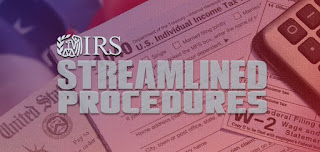On its webpage, the IRS has provided instructions for taxpayers who wish to comply with IRS's Streamlined Filing Compliance Procedures and who had a liability for the IRC §965 transition tax.
The IRC §965 transition tax generally treats the accumulated post-1986 deferred foreign income (DFI) of a Specified Foreign Corporation (SFC) as Subpart F income. IRC §965 defines DFI as the greater of the DFI of such SFC determined as of November 2, 2017, or December 31, 2017.
An election under IRC §965(h) allows a taxpayer to pay the IRC §965 net tax liability in installments over an eight-year period.
IRC §951(a)(1)(B) requires a U.S. shareholder of a CFC to include in gross income the amount determined under IRC §956 with respect to the CFC to the extent not excluded from gross income under IRC §959(a)(2). A U.S. shareholder's section 956 amount with respect to a CFC for a tax year is an amount based on the amounts of U.S. property held (directly or indirectly) by the CFC.
The streamlined filing compliance procedures (“streamlined procedures”) are available to taxpayers certifying that their failure to report foreign financial assets and pay all tax due in respect of those assets did not result from willful conduct on their part. The streamlined procedures are designed to provide to taxpayers in such situations with:
- a streamlined procedure for filing amended or delinquent returns, and
- terms for resolving their tax and penalty procedure for filing amended or delinquent returns.
A taxpayer who uses the streamlined procedures to come into compliance must remedy a specific number of tax years, generally the most recent three years for which the U.S. tax return due date (or properly-applied-for extended due date) has passed.
Now Taxpayers That Own SFCs And Have An IRC §965(A) Amount, Who Wish To Use The Streamlined Procedures,
Must Come Into Compliance For The IRC §965 Transition Tax
In Their Submission And Include The Tax Year In Which The Transition Tax Inclusion Might Occur (Generally 2017)
Even If That Tax Year Would Not Be Within The Standard Three-Year Lookback Period.
In other words, the lookback period for any submission to the Streamlined Filing Compliance Procedures involving SFCs with an IRC §965(a) inclusion in 2017 must include tax year 2017 and include all subsequent tax years.
And, The Election To Pay Net Tax Liability In Installments Under IRC §965(H)(1) Is Not Available For Taxpayers Submitting Delinquent Returns Under
The Streamlined Procedures.
Since the disclosure scope for a submission to the Streamlined Filing Compliance Procedures with a SFC will include tax years 2017 and/or 2018 and forward, noncompliant years prior to the submission scope may have previously untaxed Subpart F income or section 956 amounts. Absent the Subpart F income or section 956 amounts being reported by the taxpayer, making a submission to the streamlined procedures does not constructively provide the taxpayer with Previously Taxed Earnings & Profits (PTEP) for pre-disclosure years.
In other words, a taxpayer using the streamlined procedures must strictly comply with the Code for purposes of IRC §965 and computing PTEP. Taxpayers must properly account for and report Subpart F income and section 956 amounts in their submission, and only amounts included in income by the taxpayer prior to the submission period and amounts included as part of the submission will constitute PTEP.
Taxpayers must include "Section 965" written in red at the top of the first page of each delinquent or amended tax return and at the top of each information return. The addition of "Section 965" should be after the annotation of "Streamlined Foreign Offshore" or "Streamlined Domestic Offshore" written in red.
The webpage provides the following hypothetical for a Streamlined Foreign Offshore submission illustrates this requirement::
- Taxpayer A is a U.S. citizen who has lived abroad for her entire adult life. On January 1, 2010, Taxpayer A formed a foreign entity classified as a corporation for U.S. income tax purposes, Foreign Co. B. Taxpayer A owns 51% of Foreign Co. B, which has a calendar year end.
- Taxpayer A has not filed U.S. individual income tax returns for the last ten years, and she has never filed an extension of time to file any of her income tax returns. Her failure to file income tax returns was non-willful.
- On August 1, 2021, Taxpayer makes a submission to the Streamlined Foreign Offshore Procedures (SFO). Taxpayer A's SFO submission includes a Form 14653 and delinquent income tax returns for tax years 2017, 2018, 2019, and 2020.
- Taxpayer A must file Forms 5471 (Information Return of U.S. Persons With Respect to Certain Foreign Corporations) reporting her ownership of Foreign Corp. B.
- Taxpayer A must also address the IRC §965 transition tax on her 2017 income tax return including completing a Form 965. Taxpayer A must write in red ink on the top of the first page of each of her delinquent income tax returns and at the top of each information return "Streamlined Foreign Offshore Section 965."
Do You Have Undeclared Offshore Income?
Want to Know Which
Voluntary Disclosure Program
is Right for You?
Contact the Tax Lawyers at
Marini & Associates, P.A.
for a FREE Tax Consultation contact us at:
or Toll Free at 888-8TaxAid (888) 882-9243
Read more at: Tax Times blog











